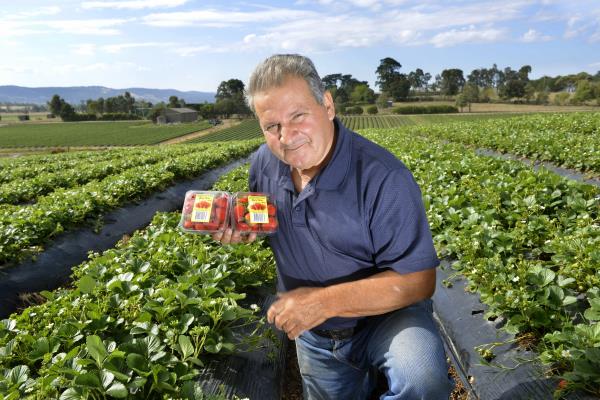By KATH GANNAWAY
YARRA Ranges berry growers are encouraging shoppers to buy local, and buy fresh, as cheap frozen berries from overseas are taken off supermarket shelves.
As of 21 February, the Australian Department of Health has recalled four imported frozen berry products, two of which are linked with the outbreak of Hepatitis A, and two as a precaution.
The berries at the centre of the contamination scare were grown overseas, raising questions about the health and hygiene standards of berry industries in some countries.
Backed by local growers, retailers have seen a boycott of imported frozen berries in favour of fresh, locally grown produce, but there is also a push for the Federal Government to bring in labelling that easily and clearly identifies imported foods.
Hoddles Creek blueberry grower, Paul Casey, is vice-president of the Australian Blueberry Association.
He says Yarra Ranges is an ideal growing environment for an industry that is experiencing an unprecedented growth spurt.
The growth in the industry across the board, along with almost year-round availability, has lifted the profile of berries as an affordable and accessible fruit.
But, he says growers don’t set out to grow berries for the freezer.
“My first priority is to maximise my first class berry. If I can minimise second class berries, that’s good farming,” he said.
There’s good news, however, for consumers who have bought into the imported frozen berry market, only to find their smoothies cut from underneath them.
“As berry production increases, by default, the second class berries will increase also, meaning growers are more able to satisfy the demand for frozen berries locally,” Mr Casey said.
There is no doubt that the ‘scare’ has been good for the industry.
“If you watch future development in Yarra Ranges there will be an increase in production of frozen berries because you have companies like Ausfresh at Yellingbo installing massive freezers to take up that opportunity,” Mr Casey added.
He has installed a freezer at his business, The Big Berry, to handle raspberries and blueberrie.
“We were prepared to take on the challenge, even before the outbreak.”
Coldstream strawberry grower, Sam Violi, said there was no doubt that a flow on from the contamination scare had been an increase in demand locally.
As president of Strawberries Australia Inc., he is in a good position to comment on where the industry is going; and he says, it’s on an upward trajectory.
Since 2002 in Victoria the number of strawberry plants has expanded almost three-fold.
“From around seven million plants in 2002, it’s increased to 19 million planted annually in Victoria, and another 16 to 19 million kept as return for the next season,” he said.
Ninety per cent of that is in the Yarra Valley and Silvan areas.
Mr Violi supplies frozen berries to jam manufacturers, and he is getting more inquiries.
“A lot of the medium fruit that supermarkets don’t want to market is an opportunity for someone to approach growers and I’m sure they could find an abundance of medium-sized fruit for freezing,” he said.
Labelling, he says, is an issue that growers have been raising with the government for years.
He says the stringent labelling, and auditing, that Australian growers have to comply with should apply to any suppliers.
“What the industry would really like to see is the imported product being grown to minimum standards set to the Australian grower.
“If we export, we have to meet overseas requirements, not ours,” Mr Violi said.
Jonathon Eccles, executive officer of Raspberries and Blackberries Australia said the issue was about food safety, rather than labelling.
“No amount of labelling would have made this better. This is a food safety issue and the point we’re making is that it’s restricted to imported frozen berries, not fresh berries.
“Our growers have to go through stringent food safety programs to get accreditation and we would expect companies sourcing product from overseas would ensure their suppliers have the same sort of standards as Australian growers.







